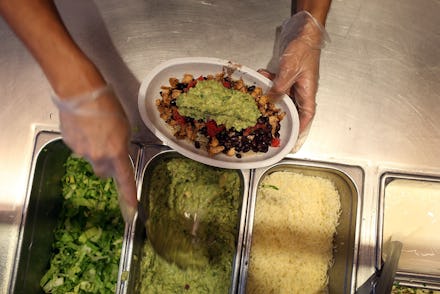These are the most common causes of food poisoning

Food poisoning is the worst. One minute you're enjoying a (hopefully) delicious meal and the next you're sick to your stomach regretting you ever ate anything at all.
According to the Centers for Disease Control and Prevention, one in six Americans will get ill from food contamination each year. If you're frequently at dinner parties of 12, the odds aren't great. There are over 250 types of foodborne illness to contract, ranging from bacteria, viruses, parasites, toxins and more. In short, eating is a scary business.
While food poisoning can hit unexpectedly, Dr. Hansa Bhargava, pediatrician and a medical editor for WebMD, said there are a few warning signs to look for to avoid getting sick from your meal. First, if the smell and taste are off, don't eat it.
"Common foods that can contribute to food poisoning are undercooked meat and poultry, as well as dairy products," Bhargava said in an email. "Sometimes raw salads or vegetables that are not properly washed can also be culprits."
The best way to avoid food poisoning? Cook at home. "Be vigilant about cooking meat and poultry properly," Bhargava said. "Cook meat and poultry at the proper temperatures, usually more than 160 degrees [Fahrenheit], and cook it thoroughly. Don't leave perishable foods out for more than an hour or two. And make sure dairy products are pasteurized and kept refrigerated in an environment less than 40 degrees [Fahrenheit]." Ensuring your kitchen utensils and countertops are clean and sanitary is also important.
If you are eating in a restaurant (who can resist?), look up their rating with your local health department and make sure your meat is thoroughly cooked. If you're out of the country, ensure the water is clean and avoid eating raw vegetables if the water is unsafe, or you have any doubts about the restaurant's cleanliness.
Once you do have food poisoning, there's unfortunately no immediate fix. "Waiting and proper hydration is the cure," Bhargava said. "Make sure you drink water, or drinks that have electrolytes and get rest. Most food poisoning incidents resolve on their own." But, if your symptoms persist for more than two days, Bhargava said its important to seek out medical attention.
A February 2015 report by the CDC broke down the most common pathogens in food poisoning, which include Salmonella, Escherichia coli O157, Listeria monocytogenes, and Campylobacter. These four account for 75% of the 9 million cases of foodborne disease in the United States each year. Here's what foods you'll find them in:
— 74% of Campylobacter illnesses were attributed to dairy and chicken.
— 82% of E. coli O157 illnesses were attributed to beef and vegetable row crops (think leafy vegetables, like lettuce).
— 81% of Listeria illnesses were attributed to fruits and dairy.
— Salmonella is the most diverse of these illnesses, with 77% of instances caused by seeded vegetables, eggs, fruits, chicken, sprouts, beef and pork.
While completely avoiding food poisoning can be nearly impossible, it's crucial to ensure that these foods were handled and cooked properly to reduce your chances of contracting foodborne illnesses.